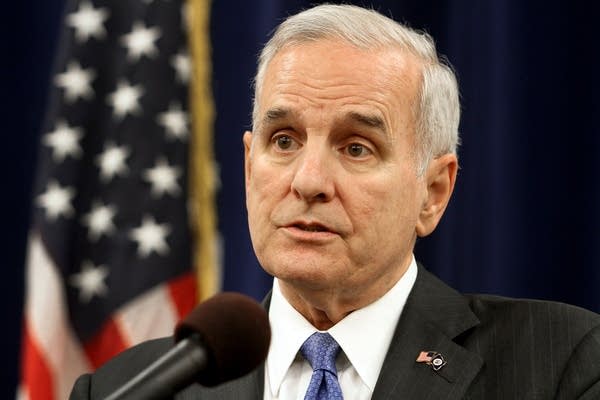GOP, DFL ready to govern in newly divided MN Legislature
Go Deeper.
Create an account or log in to save stories.
Like this?
Thanks for liking this story! We have added it to a list of your favorite stories.

The curtain goes up Tuesday on Minnesota's newly divided state government.
DFL Gov. Mark Dayton is back for a second term and Democrats are still in charge of the state Senate. But with a newly-elected Republican House majority, some wonder how competing political philosophies will mesh in the coming months.
Dayton says he's heading into the 2015 legislative session with a healthy dose of skepticism. He's heard House Republicans talking about working with him and Senate Democrats to find common ground on key issues.
He also hasn't forgotten the last time he had to negotiate with Republicans to pass a budget. His clash with GOP majorities in the House and Senate in 2011 triggered a three-week state government shutdown.
Turn Up Your Support
MPR News helps you turn down the noise and build shared understanding. Turn up your support for this public resource and keep trusted journalism accessible to all.

While he says he has no reason not to trust incoming GOP House Speaker Kurt Daudt of Crown, Dayton adds that he's unsure if more conservative House Republicans will budge from what he views as "extreme positions."
"Compromise means you agree to things you don't agree with," Dayton said. "If they're willing to adopt that approach, then we'll be successful. If they're not, then we'll have further problems."
With a projected $1 billion budget surplus, Dayton says he sees no reason to raise general fund taxes. His two-year spending plan will include new money for child-care tax credits, early learning scholarships and rural broadband expansion. He's also working on a transportation funding proposal that will likely rely on some new gas tax revenue.
Daudt says his caucus is excited about the session and a new committee structure that promises a shift in focus toward rural Minnesota. The goal is to solve problems, he said. "I think if we all do that in a bipartisan fashion ... this place will run a lot more smoothly."
Republicans, he says, are out to close the education achievement gap, help businesses create jobs and fix nursing home funding. He isn't ruling out a gas tax increase, but says he doesn't want it to be the first and only solution considered for roads and bridges.
He's also not rejecting attempts to roll back some DFL-backed initiatives from the past two years. He said one attempt might be to stop automatic, future inflationary increases to the minimum wage.
"If employers are making the decision to actually have less jobs, and there are less job opportunities for Minnesotans at the level, that might be a problem," he said of the automatic inflationary hike.
Senate Majority Leader Tom Bakk, DFL-Cook, says transportation funding and a fix for the Minnesota Sex Offender Program are among his 2015 priorities. He believes House Republicans will try hard to avoid a repeat of the 2011 budget impasse.
"That was pretty soundly rejected by voters in 2012," Bakk said. "I think they'll be more cautious trying to find some middle ground with the Senate going into this session."


